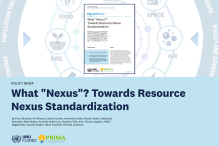In this hybrid research seminar on Thursday 12th December 2024 at 12:00-13:00 CET, Antonio Scognamillo - Economist at the Economic and Policy Analysis of Climate Change (EPIC) programme of the Food and Agriculture Organization of the United Nations (FAO) - will present his research titled "Driving Impact or Missing the Mark? Lessons Learned from e-Extension Platform Deployment in Rural Sri Lanka".
Abstract:
This study examines the impact of the Smart Extension and Efficient Decision-making (S.E.E.D) Hub, an integrated e-extension service implemented by the Food and Agriculture Organization of the United Nations (FAO) in rural Sri Lanka. The S.E.E.D Hub aimed to improve agricultural outcomes by delivering geospatially tailored market and weather information, along with farming advisory services, through a user-friendly mobile application. The initiative sought to address key challenges faced by paddy farmers, including production efficiency, risk management, marketing strategies, and food security. The program’s impact was rigorously evaluated using a Randomized Controlled Trial (RCT) involving 2,200 paddy farmers across 220 Farmer Organizations (FOs), representative of Sri Lanka’s paddy-farming population. The results reveal that the S.E.E.D Hub significantly enhanced access to timely and relevant information, with a 50% increase observed among the compliers sub-population, as measured by the Local Average Treatment Effect (LATE). Furthermore, the intervention promoted greater crop diversification and strengthened farmers’ capacity to market rice effectively, signaling potential long-term economic benefits. Despite these positive outcomes, the program did not yield significant improvements in food security or reduced vulnerability to harvest losses highlighting the limitations of standalone digital interventions and emphasizing the need for complementary measures. Policymakers are encouraged to consider integrating such initiatives with broader support mechanisms, such as access to credit, financial risk mitigation tools, and investments in rural infrastructure, to maximize their impact on agricultural resilience and livelihoods.
The zoom link to join the seminar online can be found here. This event is open to the public. All who are interested to this topic are very welcome to join the seminar. After the presentation there will be time for questions and discussion.
For any queries related to our UNU-MERIT Seminar Series, please contact Sneha Marydas and Cecilia Seri by sending an email to seminars@merit.unu.edu.

